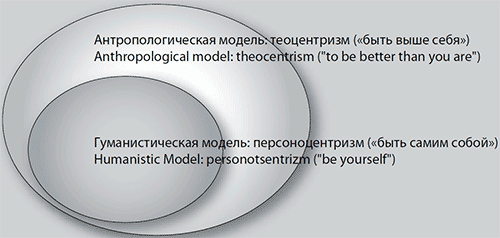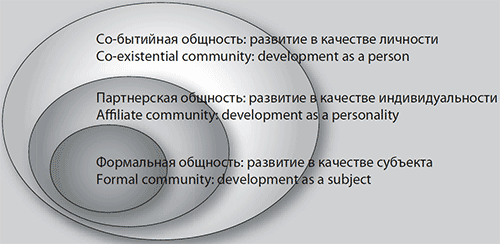Article
Shuvalov Alexander V. (2015). Anthropological aspects of health psychology. National Psychological Journal. 4, 23-36.
Abstract
The paper presents the results of a theoretical study carried out in the framework of the research project «Determinants of psychological health of the modern person». The issue of psychological health is considered in the context of the anthropological crisis that affects public body and causes a decrease in synergetic social life. On the level of specific manifestations, it is associated with damage to the spiritual and moral sphere, distortion of personal way of life and interpersonal relationships, which leads to a general decline in viability. A growing number of people, whose subjective state can be described as mentally fit, but personally sick is identified. Secondary symptoms of such conditions are depression, aggression, dependent behaviour. However, their essential characteristics are not captured by the existing social psychological, psychological pedagogical and medical psychological concepts and also do not fit the typical description of psychological emotional and/or behavioural disorders. The author adheres to the hypothesis that these states have specific spiritual and psychological conditions and symptoms that deserve scientific analysis and philosophical reflection.
The leitmotif of the paper is the issue of mental health in its scientific and philosophical sense. Representation of health from the standpoint of modern humanitarian knowledge and traditional spiritual culture are generalized. The theory of general psychological health is developed. The main approaches to the problem of psychological health are presented. Comparative analysis of the humanistic and anthropological models of mental health is shown. Correspondence between the anthropological conditions and criteria of mental health concepts of the modern national educational ideal is presented. Educational activity is described as anthropological practice aimed at acquiring by a child the wide range of values as a person. As such, it is the most conducive to maintaining and strengthening the psychological health of students.
Accepted: 04/17/2015
Pages: 23-36
DOI: 10.11621/npj.2015.0403
Keywords: mental health; psychological anthropology; subjective reality; traditionalism; postmodernism; anthropological practice;
Available Online 31.12.2015
|
General Theme Attitudes |
Mental Health Models |
|
|
Humanistic |
Anthropological |
|
|
Methodological Attitudes |
Personoriented |
Theocentric |
|
Vector |
Self-Actualization |
Universalization of Being |
|
Basis of Mental Health |
Personal development as an assertion of the self in acquiring the full functioning capacity |
Spiritual growth as the overcoming of the self in the development of the ability to decentration, dedication and love |
|
Maxim of Mental Health |
The desire for self-identity:"To be oneself" |
The desire for the fullness of human existence "to be above oneself" |
|
The image of the norm |
Originality and self-sufficiency |
Self-transcendence and synergy |
|
Development Deficiency |
Diffuse identity, limited motivational semantic sphere (superficiality, earthiness) codependency, learned helplessness |
Alienation of moral feelings, moral maturity (drained) or moral turpitude (disorientation of values), perversity, following in deeds and behaving according to the principle of "nothing is sacred" |
|
Development Deformation |
Corruption conceit ("Usefulness Complex "), the illusion of self-sufficiency, one-sidedness of the motivational-semantic sphere (self-centeredness), self-enclosed and self-confidence (arrogance) |
The metaphysical intoxication, obsession with overvalued ideas and fanaticism, delusion and self-deception of spiritual perfection (spiritual beauty) |
|
Attitudes of Psychological Assistance |
Psychological assistance is based on the presumption of individual ethics and, therefore, is carried out, as it were, "beyond good and evil"; empathic listening, phenomenological penetration, facilitation of personal growth nondirective psychotherapeutic means; supporting non-judgmental attitude: man must be taken for what it is. |
Psychological assistance affects the spiritual and the spiritual nature of man and, therefore, correlates with the moral aspects of life, with the manifestations of the "problem of good and evil"; dialogical forms of contact, focused on awakening in the person of his "spiritual self"; dominance over the Other and participator's outsidedness: empathy and faith in man, combined with the desire for objectivity in relation to the negative manifestations of his character. |
|
Ideological Orientations |
Neopagan: the evolution of man as man-godhood (selfassertion and self-deification) |
Patristic: the evolution of man as a God-man (self-transcendence and union with God) |
Table 1. Mental Health Models

Fig. 1. The ratio of mental health models

Fig. 2. Value forms of pedagogical activity
References:
Allport, G. (2002) Stanovlenie lichnosti [Development of the person]. Moscow, Smysl.
Bakhtin, M.M. (1963) Problemy pojetiki Dostoevskogo [Issues of Dostoevsky’s poetics]. Moscow, Sovietskiy pisatel’.
Bratus’, B.S. (1997) Obraz cheloveka v psikhologii [The image of person in psychology]. Psikhologiya s chelovecheskim litsom: gumanisticheskaya perspektiva v postsovetskoy psikhologii [Psychology with a human face: a humanistic perspective in the post-Soviet psychology]. Moscow, Smysl, 67-91.
Bratus’, B.S. (2000) Russkaya, sovetskaya, rossiyskaja psikhologiya [Russian, Soviet, Russian psychology]. Moscow, Flint.
Chesnokova M.G. (2013). General psychological bases for individual health research. National Psychological Journal, 1, 96–102.
Danyluk, A.Y., Kondakov, A.M., & Tishkov, V.A. (2011) Kontseptsiya dukhovno-nravstvennogo razvitiya i vospitaniya lichnosti grazhdanina Rossii [The concept of spiritual and moral development and education of a citizen of Russia]. Moscow, Prosveschenie.
Doklad YuNISEF «Analiz polozheniya detey v Rossiyskoy Federatsii» [UNICEF report «Analysis of the situation of children in the Russian Federation»]. Sayt Upolnomochennogo pri Prezidente Rossiyskoy Federatsii po pravam rebenka, 2013 [Website of the Commissioner of the President of the Russian Federation for the Rights of the Child, 2013]. URL: http://www.rfdeti.ru/files/1270207063_analiz_rf.pdf (date of treatment: 04/05/2013 ).
(Ed.) Dubrovin, I.V. (2004) Vvedenie v prakticheskuyu psikhologiyu obrazovaniya [Introduction to the practical psychology of education]. Prakticheskaya psikhologiya obrazovaniya [Practical psychology of education]. SPb, Piter, 15-178.
Florenskaya, T.A. (2009) Mir doma tvoego. Chelovek v reshenii zhiznennykh problem [The world of your house. Man in solving life’s problems]. Moscow, Russkii Khronograf.
Frank, S.L. (2010) Chelovek i Bog [Man and God]. Minsk, Belorusskaya Pravoslavnaya Tserkov’.
Frankl, V. (1990) Chelovek v poiskakh smysla [Man in search of meaning]. Moscow, Progress.
(2014) K 70-letiyu V.I. Slobodchikova [On the 70th anniversary of V.I. Slobodchikov]. Voprosy psikhologii [Issues of psychology]. 4, 143-149.
Khamitov, N.V. (2002) Filosofiya cheloveka: ot metafiziki k metaantropologii [The philosophy of the person, from metaphysics to meta-antropologii]. Kiev, Nika-Tsenter.
Leontiev, K.N. (1992) Vizantizm i slavyanstvo[Byzantium and the Slavs]. Zapiski otshel’nika [Notes of a hermit]. Moscow.
Maslow, A.G. (1999) Motivatsiya i lichnost’ [Motivation and Personality]. SPb, Evrasia.
Nicholas Serbian, St. (2010) Mysli o dobre i zle [Thoughts of right and wrong]. Minsk, Izdatel’stvo D. Kharchenko.
(Ed.) Nikiforov, G.S. (2003) Psikhologiya zdorov’ya. Uchebnik dlya vuzov [Health Psychology. Textbook for high schools]. SPb, Piter.
Pavel Astakhov schitaet suitsidy gosudarstvennoy tragediey [Pavel Astakhov considers suicides a public tragedy]. Sayt Upolnomochennogo pri Prezidente Rossiyskoy Federatsii po pravam rebenka, 2013 [Website of the Commissioner of the President of the Russian Federation for the Rights of the Child, 2013]. URL: http://www.rfdeti.ru/display.php?id=4735 (the date of circulation: 04.05.2013).
Reshetnikov Ì.Ì. (2015). Mental health of Russian population: new tendencies and old problems. National psychological journal [Natsional’nyy psikhologicheskiy zhurnal], 1, 9-15.
Rogers, K.R. (1994) Vzglyad na psikhoterapiyu. Stanovlenie cheloveka [A look at psychotherapy. Becoming a person]. Moscow, Progress.
Schmemann, A., Archpriest (2005) Dnevniki 1973-1983 [Diaries 1973-1983]. Moscow, Russkiy put’.
Shuvalov, A.V. Printsip simfonii v sisteme obrazovaniya (psikhologo-pedagogicheskoe esse) [The principle of the symphony in the education system (psycho-pedagogical essay)]. Obrazovatel’naya politika [Educational Policy], 2011a. № 3. S. 97-105.
Shuvalov, A.V. (2011b) Antropologicheskiy podkhod k probleme psikhologicheskogo zdorov’ya [The anthropological approach to the problem of psychological health]. Voprosy psikhologii [Issues of psychology]. 5, 3-16.
Shuvalov, A.V. Problema psikhologicheskogo zdorov’ya v svete pravoslavnoy dukhovnoy traditsii [The issue of mental health in the light of the Orthodox spiritual tradition]. Chelovek 2011[Man 2011]. 6, 134-151.
Shuvalov, A.V. (2012) Psikhologicheskoe zdorov’e i gumanitarnye praktiki [Psychological health and humanitarian practice]. Voprosy psikhologii [Issues of psychology]. 1, 1-10.
Shuvalov, A.V. (2013) Invarianty psikhologicheskogo chelovekoznaniya [Invariants of psychological anthropology]. [Bulletin of Saint Tikhon’s Orthodox University]. Series 4, Pedagogy, Psychology.1 (28), 109-128.
Shuvalov, A.V. (2014a) Psikhologo-pedagogicheskie aspekty realizatsii vospitatel’nogo ideala [Psychological pedagogical aspects of the implementating the educational ideal]. Voprosy psikhologii [Issues of psychology]. 5, 57-70.
Shuvalov, A.V. (2014b) Metodologicheskie aspekty psikhologicheskogo chelovekoznaniya [Methodological aspects of psychological anthropology]. National Psychological Journal [Natsional’nyy psikhologicheskiy zhurnal], 3, 17-27.
Slobodchikov, V.I., & Isaev, E.I. (1995) Osnovy psikhologicheskoy antropologii. Psikhologiya cheloveka: vvedenie v psikhologiyu sub’ektivnosti. Uchebnoe posobie dlya vuzov. [Fundamentals of psychological anthropology. Human Psychology: An Introduction to the psychology of subjectivity. Textbook for high schools]. Moscow, Shkola-Press.
Slobodchikov, V.I., & Isaev, E.I. (2000) Osnovy psikhologicheskoy antropologii. Psikhologiya cheloveka: razvitie sub’ektivnoy real’nosti v ontogeneze. Uchebnoe posobie dlya vuzov. [Fundamentals of psychological anthropology. Psychology of human development: the development of subjective reality in ontogeny. Textbook for high schools]. Moscow, Shkola-Press.
Slobodchikov, V.I. (2012) Kategorial’nyy stroy postneklassicheskoy psikhologii cheloveka [Categorical structure of postnonclassical human psychology]. Sovremennaya lichnost’: Psikhologicheskie issledovaniya [Modern personality: Psychological studies]. Moscow, Izdatel’stvo «Institut psikhologii RAN».
Slobodchikov, V.I., & Shuvalov, A.V. (2001) Antropologicheskiy podkhod k resheniyu problemy psikhologicheskogo zdorov’ya detey [Anthropological approach to the problems of mental health in children]. Voprosy psikhologii [Issues of psychology]. 4, 91-105.
Sokolova, E.T. (2013). Cultural-psychological and clinical perspectives of research on phenomena of subjective uncertainty and ambiguity. Psychology in Russia: State of the Art, 6(2), 78-88. doi: 10.11621/pir.2013.0207
Solovyov, V.S. (1988) Opravdanie dobra. Nravstvennaya filosofiya [Justification of the Good. Moral philosophy]. Vol. 2. Moscow.
Stepin, V.S. (2009) Klassika, neklassika, postneklassika: kriterii razlicheniya [Classical, non-classics, post- non-classics: criteria for distinguishing]. Postneklassika: filosofiya, nauka, kul’tura [Post-non-classics: philosophy, science, and culture]. St. Petersburg: Izdatel’skiy dom “Mir”, 249-295.
Zinchenko Yuriy Ð., Busygina Ina S. (2013). Psychological health and professional actualization of the company executive. National Psychological Journal [Natsional’nyy psikhologicheskiy zhurnal], 1, 89–95.
For citing this article:
Shuvalov Alexander V. (2015). Anthropological aspects of health psychology. National Psychological Journal. 4, 23-36.









